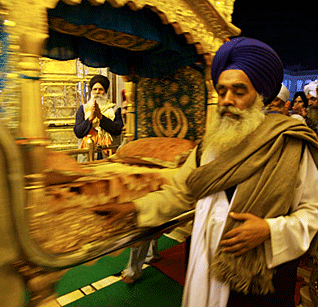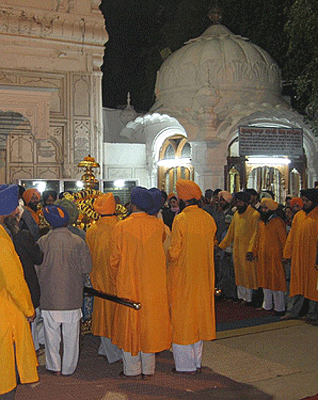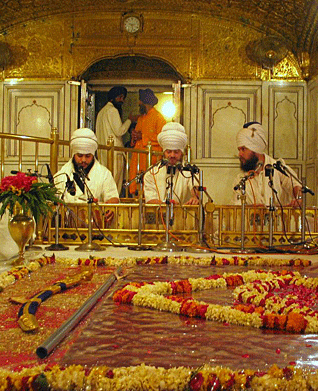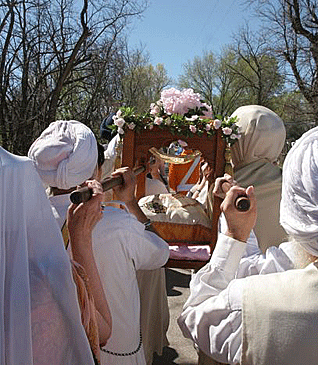
Above: photo by Charles Meacham. Below, first from bottom: A savaari in Espanola, New Mexico, U.S.A. This and the second from bottom: courtesy, Gurmustuk Singh. Third from bottom: courtesy, Sukhminder Singh.



Columnists
The Janeus We Wear
by TEJWANT SINGH
Are some of us back to wearing janeus (the Hindu sacred thread) that the child Guru Nanak had refused to don even at the tender age of seven?
By the look of the rituals performed everyday at Harmandar Sahib, for example, it seems that we are. In order to express my viewpoint, I would like to first share what I see Sikhi to be.
First and foremost, Sikhi is the only religion amongst the six world faiths that is not personality-based, but idea-based. Islam (Mohammed), Christianity (Jesus), Judaism ("Messiah in coming"), and Hinduism (Ram Chander ji, Krishan ji, and many other deities), all had their respective embodiments personified as having and proclaiming a direct link to the Almighty. The sixth, Buddhism, intrinsically revolves around Gautama Buddha.
If Sikhi was to be one more religion based on personalities, then Guru Granth Sahib would have only had the compositions of the Sikh Gurus, instead of the current formulation: the teachings of six Gurus and thirty-one saints from other religions, including Hinduism and Islam. And, our Gurus would have been worshipping each other, rather than Ik Ong Kaar, the One True God.
If Sikhi was based on personalities, then Harmandar Sahib - the most sacred shrine in Sikhi - would not have had four doors to welcome all mankind, nor would a Muslim have been asked to lay its foundation stone. If it was based on personalities, we would not have the sangat and pangat concept of breaking bread with everyone and anyone from any hue, creed or background, in the Guru ka Langar.
While growing up in Ferozepore, Punjab, my family and I used to visit Harmandar Sahib often, as it is only sixty miles away. During one of these journeys, I remember my mother, who we lovingly called Ammi ji, explaining to me the beautiful ritual of carrying Guru Granth Sahib from the Akal Takht to Harmandar Sahib in a huge and ornate palki of gold. I was about ten then. She said that it is common knowledge that when people carry the palki for prakash in the early hours of amrit vela, it is very heavy ... as if the Gurus were actually sitting in it; but when they bring it back empty, it is disproportionately lighter.
About ten years ago, I had the opportunity to visit Harmandar Sahib and participate in the same ritual by taking turns in offering my shoulder to carry the Palki Sahib to and from the sanctum sanctorum every morning for a full week.
The first bewildering realization was that no women were allowed to participate in this ritual; sadly, it remains true, even today.
The event reminded me of Ammi ji's story from thirty years earlier. All of a sudden, I became very alert and was ready to observe the sudden loss of weight of the Palki Sahib, while carrying it back to the Akal Takht. I did not feel any difference in weight while carrying it empty. I did this for one week and felt the same. However, everyone I talked to who participated in the procession never ceased talking about feeling the sudden loss of weight, describing it with great reverence.
I never understood why we Sikhs feel the need to take on this psychosomatic belief in order to believe in the existence of Ik Ong Kaar in a "physical" form.
I would like to expand this further through Gurbani.
Ik Ong Kaar is neither a deity nor a "physical" embodiment, but Creative Energy, as explained beautifully by Guru Nanak in the Mool Mantar that we recite several times a day. So, now the question arises, how shall a Sikh tap into that Creative Energy?
We read everyday in the Japji:
Gaviaey suniaey munn rukhiaey bhao, dukh purhar sukh ghar lae jaey
("By singing, listening, contemplating and putting gurmat in practice, we can find true happiness".)
We perform the first part very well when we know the words of the shabad and start singing along with raagis. Unfortunately, we stop at the first one. We do not even contemplate what "suniaey" and "munn rakhiaey bhao" would bring us.
This is where, our Gurus have indicated, dwells the nectar of Sikhi. The singing, in itself and without anything more, becomes a mere ritual, the same as cleaning off the non-existent dust from the inner sheets of the Guru Granth, washing the palki with milk and, last but not least, touching the chaur to our foreheads every time we pretend to whisk a fly or two ... and the many other acts we perform daily so mechanically.
It is also worth noticing that at Harmandar Sahib, the most sacred shrine of the Sikh panth, not even a single female Sikh chants the savaeaey that are recited everyday when Guru Granth Sahib's prakash takes place. I have not seen an all-female raagi jatha performing there either. I hope there are some. The ironic part is, that this beautiful hymn from Asa di Vaar is recited every morning:
So kion manda akhieay jin jamaey rajaan
("How can we denigrate the very one who gives birth to kings?")
And, no female Sikh is found anywhere among the sevadaars or the granthis.
The whole essence of Sikhi is that it is based on ideas. We, in our everyday lives, play with ideas. The good ones we embrace and put into practice to make our lives better, the bad ones we discard. Guru Granth Sahib is our sacred book of Gurmat ideas that need to be put in practice through rehat.
Gurmat challenges our thought processes, so that we can discard the rituals that contradict it, and embrace those that complement it.
So, in order for us to separate "janeu" rituals from the meaningful ones, we have to try to understand and work with the tools bestowed upon us by our Gurus via Gurbani. Only by living up to these ideals can we tap into the heart and soul of Sikhi.
October 24, 2007
Conversation about this article
1: Vikram Singh (New York, U.S.A.), October 24, 2007, 9:36 PM.
Very true! For example, nowdays it looks like people are more interested in having "akhand paaths" by giving a certain fee, rather then doing the seva themselves, etc. Will our guru be more happy with this? Never! It's time to change such practices.
2: Rajeev (Aylesbury, U.K.), October 25, 2007, 11:10 AM.
I should say that some of us have entered more into the realm of rituals, rather than listening to or comprehending what our Gurus said via their teachings. As I understand him, Guru Nanak is very clear on certain aspects of attaining God and he stresses on the importance of "Naam". Personally, I like it a lot and believe that it is worth revisiting the bani regularly. If one invests time in studying and understanding gurbani and living it, I think it can change our very outlook on life. I think it's about time to stop concentrating on ritualistic behaviour and instead pay attention to the message of the Guru.
3: Tejwant (U.S.A.), October 25, 2007, 12:48 PM.
Rajeev, what you said makes a lot of sense. It reminds me of a saying, "If we change the way we look at things, then the things we look at change" ... Isn't this what Sikhi is all about?
4: Pritam Singh Grewal (Canada), October 25, 2007, 1:59 PM.
Well done, Tejwant Singh! Really a thought-provoking article. Sometimes I feel it is very hard, rather impossible, for well-meaning followers of Gurmat - the ideas emanating from the Shabad Guru - to rescue Sikhi from ritualism and hypocrisy. Take the example of the concept of Naam. Naam's very definition has been rendered so complicated and unintelligible that one is made dependent on so-called sants, sadhs and deradars. See how clearly Guru Nanak Sahib defines Naam in Japji- 'Jayta keeta, tayta naon/Bin navay naahin ko thaon' ... "The entire creation is (suffused with) Naam; no place or setting exists without Naam."
5: Brijinder Khurana (Delhi, India), October 26, 2007, 4:45 AM.
Very honest article. If we perform our duties as per our Gurus, we'll become true Sikhs.
6: D.J.Singh (U.S.A.), October 27, 2007, 7:54 PM.
Faith in religion is a belief beyond evidence or logical arguments. Devotees have varied spiritual experiences. They may even receive different messages from the same sermon. What we receive from these interactions depends in part on our maturity and understanding of the scriptures. Nevertheless, any act that genuinely focuses the mind on the divine is best left to individual interpretation.
7: Akashdeep Singh Aulakh (Portland, U.S.A.), October 28, 2007, 5:44 PM.
Nice article. Our Gurus have laid stress on being logical while living in Sikhi. I too am concerned over rituals such as the washing of marble floors with milk, or the keeping of a "jyot" lit all the time in the presence of Guru Granth, even when gurbani calls knowledge and gurgyan as the ulitmate jyot.
8: Gurmit Singh (Sydney, Australia), November 26, 2008, 1:24 AM.
Many thanks for sharing this article. Gurus Sahibaan had advised us to disassociate ourselves from futile rituals/rites which were being performed by the Hindus, Muslims and other Sidh-Yogis, etc. But we, instead of following the Gurus' teachings as reflected in Gurbani contained in the Guru Granth Sahib, have absolutely forgotten them. In fact, we have started imitating brahminical doctrine/hindutva and even gone ahead of Hindu priests and Muslim clerics. Although, I have not visited Darbar Sahib since 1982, I could make out that it has now adapted several Hindu practices which go 180 degrees against Sikh teachings. After 1984, the current regime has started worshipping the sun and moon, and celebrating dussehra, diwali, lohri, maghi, etc, (as if they are Sikh in nature) and now they are ready to enact a play, Bachitter Natak.
9: Veronica Sidhu (Scotch Plains, New Jersey, U.S.A.), November 10, 2010, 1:55 PM.
In Sach Khand, there is no "drama", only the love of God. Our human nature creates the drama. How precious then is the bani of our Gurus who lead us to Sach Khand and truly Living Sikhi. If only we open our hearts and mind to it.


